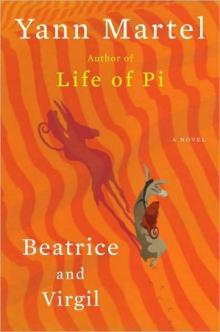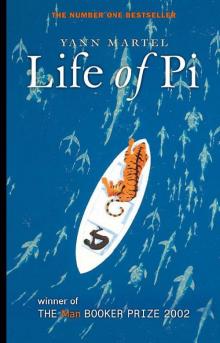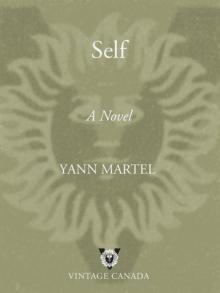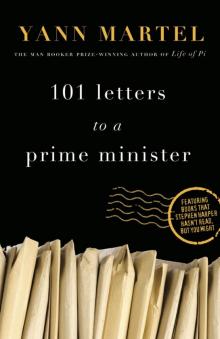- Home
- Yann Martel
Life of Pi Page 9
Life of Pi Read online
Page 9
Why do people move? What makes them uproot and leave everything they've known for a great unknown beyond the horizon? Why climb this Mount Everest of formalities that makes you feel like a beggar? Why enter this jungle of foreignness where everything is new, strange and difficult?
The answer is the same the world over: people move in the hope of a better life.
The mid-1970s were troubled times in India. I gathered that from the deep furrows that appeared on Father's forehead when he read the papers. Or from snippets of conversation that I caught between him and Mother and Mamaji and others. It's not that I didn't understand the drift of what they said--it's that I wasn't interested. The orangutans were as eager for chapattis as ever; the monkeys never asked after the news from Delhi; the rhinos and goats continued to live in peace; the birds twittered; the clouds carried rain; the sun was hot; the earth breathed; God was--there was no Emergency in my world.
Mrs. Gandhi finally got the best of Father. In February 1976, the Tamil Nadu government was brought down by Delhi. It had been one of Mrs. Gandhi's most vocal critics. The takeover was smoothly enforced--Chief Minister Karunanidhi's ministry vanished quietly into "resignation" or house arrest--and what does the fall of one local government matter when the whole country's Constitution has been suspended these last eight months? But it was to Father the crowning touch in Mrs. Gandhi's dictatorial takeover of the nation. The camel at the zoo was unfazed, but that straw broke Father's back.
He shouted, "Soon she'll come down to our zoo and tell us that her jails are full, she needs more space. Could we put Desai with the lions?"
Morarji Desai was an opposition politician. No friend of Mrs. Gandhi's. It makes me sad, my father's ceaseless worrying. Mrs. Gandhi could have personally bombed the zoo, it would have been fine with me if Father had been gay about it. I wish he hadn't fretted so much. It's hard on a son to see his father sick with worry.
But worry he did. Any business is risky business, and none more so than small b business, the one that risks the shirt on its back. A zoo is a cultural institution. Like a public library, like a museum, it is at the service of popular education and science. And by this token, not much of a money-making venture, for the Greater Good and the Greater Profit are not compatible aims, much to Father's chagrin. The truth was, we were not a rich family, certainly not by Canadian standards. We were a poor family that happened to own a lot of animals, though not the roof above their heads (or above ours, for that matter). The life of a zoo, like the life of its inhabitants in the wild, is precarious. It is neither big enough a business to be above the law nor small enough to survive on its margins. To prosper, a zoo needs parliamentary government, democratic elections, freedom of speech, freedom of the press, freedom of association, rule of law and everything else enshrined in India's Constitution. Impossible to enjoy the animals otherwise. Long-term, bad politics is bad for business.
People move because of the wear and tear of anxiety. Because of the gnawing feeling that no matter how hard they work their efforts will yield nothing, that what they build up in one year will be torn down in one day by others. Because of the impression that the future is blocked up, that they might do all right but not their children. Because of the feeling that nothing will change, that happiness and prosperity are possible only somewhere else.
The New India split to pieces and collapsed in Father's mind. Mother assented. We would bolt.
It was announced to us one evening during dinner. Ravi and I were thunderstruck. Canada! If Andhra Pradesh, just north of us, was alien, if Sri Lanka, a monkey's hop across a strait, was the dark side of the moon, imagine what Canada was. Canada meant absolutely nothing to us. It was like Timbuktu, by definition a place permanently far away.
CHAPTER 30
He's married. I am bent down, taking my shoes off, when I hear him say, "I would like you to meet my wife." I look up and there beside him is ... Mrs. Patel. "Hello," she says, extending her hand and smiling. "Piscine has been telling me lots about you." I can't say the same of her. I had no idea. She's on her way out, so we talk only a few minutes. She's also Indian but has a more typically Canadian accent. She must be second generation. She's a little younger than him, skin slightly darker, long black hair woven in a tress. Bright dark eyes and lovely white teeth. She has in her arms a dry-cleaned white lab coat in a protective plastic film. She's a pharmacist. When I say, "Nice meeting you, Mrs. Patel," she replies, "Please, make it Meena." After a quick kiss between husband and wife, she's off on a working Saturday.
This house is more than a box full of icons. I start noticing small signs of conjugal existence. They were there all along, but I hadn't seen them because I wasn't looking for them.
He's a shy man. Life has taught him not to show off what is most precious to him.
Is she the nemesis of my digestive tract?
"I've made a special chutney for you," he says. He's smiling.
No, he is.
CHAPTER 31
They met once, Mr. and Mr. Kumar, the baker and the teacher. The first Mr. Kumar had expressed the wish to see the zoo. "All these years and I've never seen it. It's so close by, too. Will you show it to me?" he asked.
"Yes, of course," I replied. "It would be an honour."
We agreed to meet at the main gate the next day after school.
I worried all that day. I scolded myself, "You fool! Why did you say the main gate? At any time there will be a crowd of people there. Have you forgotten how plain he looks? You'll never recognize him!" If I walked by him without seeing him he would be hurt. He would think I had changed my mind and didn't want to be seen with a poor Muslim baker. He would leave without saying a word. He wouldn't be angry--he would accept my claims that it was the sun in my eyes--but he wouldn't want to come to the zoo any more. I could see it happening that way. I had to recognize him. I would hide and wait until I was certain it was him, that's what I would do. But I had noticed before that it was when I tried my hardest to recognize him that I was least able to pick him out. The very effort seemed to blind me.
At the appointed hour I stood squarely before the main gate of the zoo and started rubbing my eyes with both hands.
"What are you doing?"
It was Raj, a friend.
"I'm busy."
"You're busy rubbing your eyes?"
"Go away."
"Let's go to Beach Road."
"I'm waiting for someone."
"Well, you'll miss him if you keep rubbing your eyes like that."
"Thank you for the information. Have fun on Beach Road."
"How about Government Park?"
"I can't, I tell you."
"Come on."
"Please, Raj, move on!"
He left. I went back to rubbing my eyes.
"Will you help me with my math homework, Pi?"
It was Ajith, another friend.
"Later. Go away."
"Hello, Piscine."
It was Mrs. Radhakrishna, a friend of Mother's. In a few more words I eased her on her way.
"Excuse me. Where's Laporte Street?"
A stranger.
"That way."
"How much is admission to the zoo?"
Another stranger.
"Five rupees. The ticket booth is right there."
"Has the chlorine got to your eyes?"
It was Mamaji.
"Hello, Mamaji. No, it hasn't."
"Is your father around?"
"I think so."
"See you tomorrow morning."
"Yes, Mamaji."
"I am here, Piscine."
My hands froze over my eyes. That voice. Strange in a familiar way, familiar in a strange way. I felt a smile welling up in me.
"Salaam alaykum, Mr. Kumar! How good to see you."
"Wa alaykum as-salaam. Is something wrong with your eyes?"
"No, nothing. Just a bit of dust."
"They look quite red."
"It's nothing."
He headed for the ticket booth but I called him ba
ck.
"No, no. Not for you, master."
It was with pride that I waved the ticket collector's hand away and showed Mr. Kumar into the zoo.
He marvelled at everything, at how to tall trees came tall giraffes, how carnivores were supplied with herbivores and herbivores with grass, how some creatures crowded the day and others the night, how some that needed sharp beaks had sharp beaks and others that needed limber limbs had limber limbs. It made me happy that he was so impressed.
He quoted from the Holy Qur'an: "In all this there are messages indeed for a people who use their reason."
We came to the zebras. Mr. Kumar had never heard of such creatures, let alone seen one. He was dumbfounded.
"They're called zebras," I said.
"Have they been painted with a brush?"
"No, no. They look like that naturally."
"What happens when it rains?"
"Nothing."
"The stripes don't melt?"
"No."
I had brought some carrots. There was one left, a large and sturdy specimen. I took it out of the bag. At that moment I heard a slight scraping of gravel to my right. It was Mr. Kumar, coming up to the railing in his usual limping and rolling gait.
"Hello, sir."
"Hello, Pi."
The baker, a shy but dignified man, nodded at the teacher, who nodded back.
An alert zebra had noticed my carrot and had come up to the low fence. It twitched its ears and stamped the ground softly. I broke the carrot in two and gave one half to Mr. Kumar and one half to Mr. Kumar. "Thank you, Piscine," said one; "Thank you, Pi," said the other. Mr. Kumar went first, dipping his hand over the fence. The zebra's thick, strong, black lips grasped the carrot eagerly. Mr. Kumar wouldn't let go. The zebra sank its teeth into the carrot and snapped it in two. It crunched loudly on the treat for a few seconds, then reached for the remaining piece, lips flowing over Mr. Kumar's fingertips. He released the carrot and touched the zebra's soft nose.
It was Mr. Kumar's turn. He wasn't so demanding of the zebra. Once it had his half of the carrot between its lips, he let go. The lips hurriedly moved the carrot into the mouth.
Mr. and Mr. Kumar looked delighted.
"A zebra, you say?" said Mr. Kumar.
"That's right," I replied. "It belongs to the same family as the ass and the horse."
"The Rolls-Royce of equids," said Mr. Kumar.
"What a wondrous creature," said Mr. Kumar.
"This one's a Grant's zebra," I said.
Mr. Kumar said, "Equus burchelli boehmi."
Mr. Kumar said, "Allahu akbar."
I said, "It's very pretty."
We looked on.
CHAPTER 32
There are many examples of animals coming to surprising living arrangements. All are instances of that animal equivalent of anthropomorphism: zoomorphism, where an animal takes a human being, or another animal, to be one of its kind.
The most famous case is also the most common: the pet dog, which has so assimilated humans into the realm of doghood as to want to mate with them, a fact that any dog owner who has had to pull an amorous dog from the leg of a mortified visitor will confirm.
Our golden agouti and spotted paca got along very well, contentedly huddling together and sleeping against each other until the first was stolen.
I have already mentioned our rhinoceros-and-goat herd, and the case of circus lions.
There are confirmed stories of drowning sailors being pushed up to the surface of the water and held there by dolphins, a characteristic way in which these marine mammals help each other.
A case is mentioned in the literature of a stoat and a rat living in a companion relationship, while other rats presented to the stoat were devoured by it in the typical way of stoats.
We had our own case of the freak suspension of the predator-prey relationship. We had a mouse that lived for several weeks with the vipers. While other mice dropped in the terrarium disappeared within two days, this little brown Methuselah built itself a nest, stored the grains we gave it in various hideaways and scampered about in plain sight of the snakes. We were amazed. We put up a sign to bring the mouse to the public's attention. It finally met its end in a curious way: a young viper bit it. Was the viper unaware of the mouse's special status? Unsocialized to it, perhaps? Whatever the case, the mouse was bitten by a young viper but devoured--and immediately--by an adult. If there was a spell, it was broken by the young one. Things returned to normal after that. All mice disappeared down the vipers' gullets at the usual rate.
In the trade, dogs are sometimes used as foster mothers for lion cubs. Though the cubs grow to become larger than their caregiver, and far more dangerous, they never give their mother trouble and she never loses her placid behaviour or her sense of authority over her litter. Signs have to be put up to explain to the public that the dog is not live food left for the lions (just as we had to put up a sign pointing out that rhinoceros are herbivores and do not eat goats).
What could be the explanation for zoomorphism? Can't a rhinoceros distinguish big from small, tough hide from soft fur? Isn't it plain to a dolphin what a dolphin is like? I believe the answer lies in something I mentioned earlier, that measure of madness that moves life in strange but saving ways. The golden agouti, like the rhinoceros, was in need of companionship. The circus lions don't care to know that their leader is a weakling human; the fiction guarantees their social well-being and staves off violent anarchy. As for the lion cubs, they would positively keel over with fright if they knew their mother was a dog, for that would mean they were motherless, the absolute worst condition imaginable for any young, warm-blooded life. I'm sure even the adult viper, as it swallowed the mouse, must have felt somewhere in its undeveloped mind a twinge of regret, a feeling that something greater was just missed, an imaginative leap away from the lonely, crude reality of a reptile.
CHAPTER 33
He shows me family memorabilia. Wedding photos first. A Hindu wedding with Canada prominently on the edges. A younger him, a younger her. They went to Niagara Falls for their honeymoon. Had a lovely time. Smiles to prove it. We move back in time. Photos from his student days at U of T: with friends; in front of St. Mike's; in his room; during Diwali on Gerrard Street; reading at St. Basil's Church dressed in a white gown; wearing another kind of white gown in a lab of the zoology department; on graduation day. A smile every time, but his eyes tell another story.
Photos from Brazil, with plenty of three-toed sloths in situ.
With a turn of a page we jump over the Pacific--and there is next to nothing. He tells me that the camera did click regularly--on all the usual important occasions--but everything was lost. What little there is consists of what was assembled by Mamaji and mailed over after the events.
There is a photo taken at the zoo during the visit of a V.I.P. In black and white another world is revealed to me. The photo is crowded with people. A Union cabinet minister is the focus of attention. There's a giraffe in the background. Near the edge of the group, I recognize a younger Mr. Adirubasamy.
"Mamaji?" I ask, pointing.
"Yes," he says.
There's a man next to the minister, with horn-rimmed glasses and hair very cleanly combed. He looks like a plausible Mr. Patel, face rounder than his son's.
"Is this your father?" I ask.
He shakes his head. "I don't know who that is."
There's a pause of a few seconds. He says, "It's my father who took the picture."
On the same page there's another group shot, mostly of schoolchildren. He taps the photo.
"That's Richard Parker," he says.
I'm amazed. I look closely, trying to extract personality from appearance. Unfortunately, it's black and white again and a little out of focus. A photo taken in better days, casually. Richard Parker is looking away. He doesn't even realize that his picture is being taken.
The opposing page is entirely taken up by a colour photo of the swimming pool of the Aurobindo Ashram. It's
a nice big outdoor pool with clear, sparkling water, a clean blue bottom and an attached diving pool.
The next page features a photo of the front gate of Petit Seminaire school. An arch has the school's motto painted on it: Nil magnum nisi bonum. No greatness without goodness.
And that's it. An entire childhood memorialized in four nearly irrelevant photographs.
He grows sombre.
"The worst of it," he says, "is that I can hardly remember what my mother looks like any more. I can see her in my mind, but it's fleeting. As soon as I try to have a good look at her, she fades. It's the same with her voice. If I saw her again in the street, it would all come back. But that's not likely to happen. It's very sad not to remember what your mother looks like."
He closes the book.
CHAPTER 34
Father said, "We'll sail like Columbus!"
"He was hoping to find India," I pointed out sullenly.
We sold the zoo, lock, stock and barrel. To a new country, a new life. Besides assuring our collection of a happy future, the transaction would pay for our immigration and leave us with a good sum to make a fresh start in Canada (though now, when I think of it, the sum is laughable--how blinded we are by money). We could have sold our animals to zoos in India, but American zoos were willing to pay higher prices. CITES, the Convention on International Trade in Endangered Species, had just come into effect, and the window on the trading of captured wild animals had slammed shut. The future of zoos would now lie with other zoos. The Pondicherry Zoo closed shop at just the right time. There was a scramble to buy our animals. The final buyers were a number of zoos, mainly the Lincoln Park Zoo in Chicago and the soon-to-open Minnesota Zoo, but odd animals were going to Los Angeles, Louisville, Oklahoma City and Cincinnati.
And two animals were being shipped to the Canada Zoo. That's how Ravi and I felt. We did not want to go. We did not want to live in a country of gale-force winds and minus-two-hundred-degree winters. Canada was not on the cricket map. Departure was made easier--as far as getting us used to the idea--by the time it took for all the pre-departure preparations. It took well over a year. I don't mean for us. I mean for the animals. Considering that animals dispense with clothes, footwear, linen, furniture, kitchenware, toiletries; that nationality means nothing to them; that they care not a jot for passports, money, employment prospects, schools, cost of housing, healthcare facilities--considering, in short, their lightness of being, it's amazing how hard it is to move them. Moving a zoo is like moving a city.

 Beatrice and Virgil
Beatrice and Virgil Life of Pi
Life of Pi Self
Self The High Mountains of Portugal
The High Mountains of Portugal 101 Letters to a Prime Minister
101 Letters to a Prime Minister